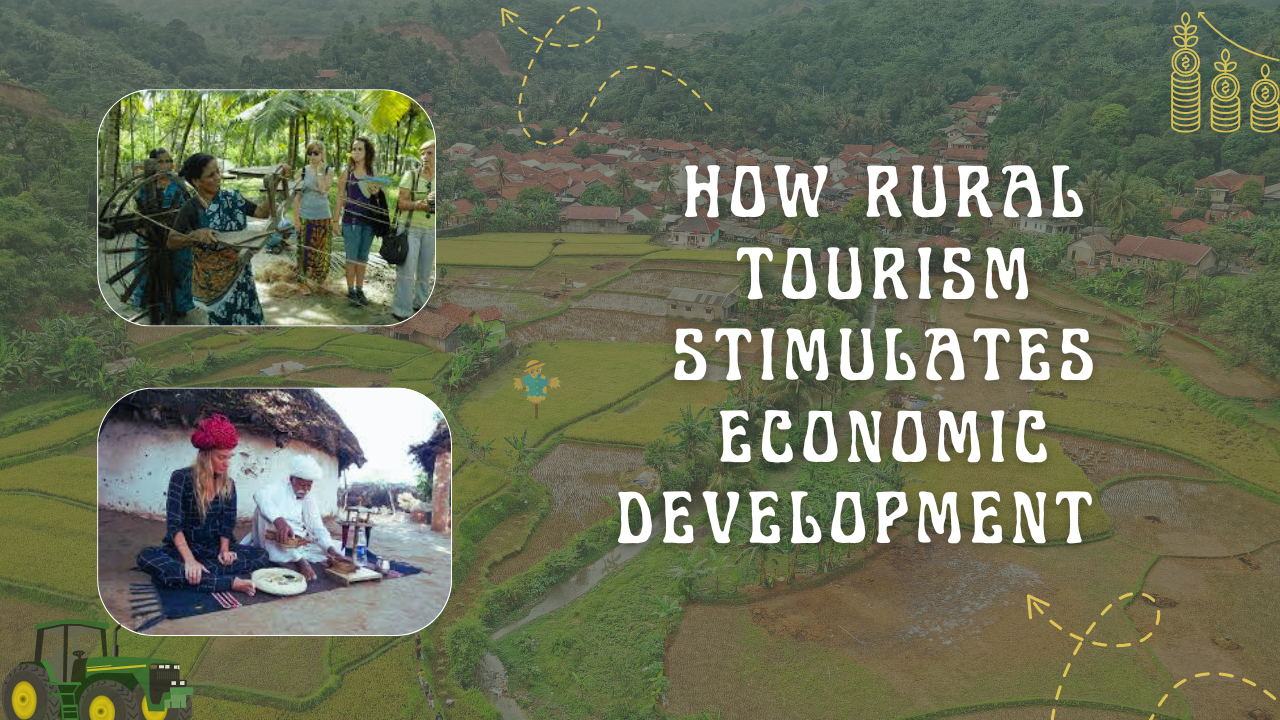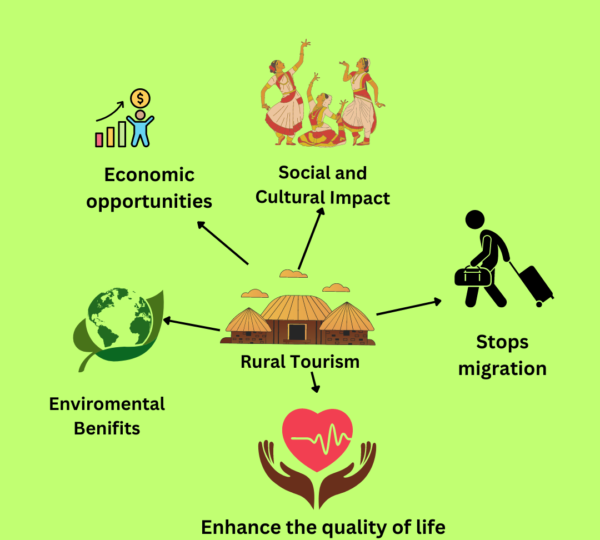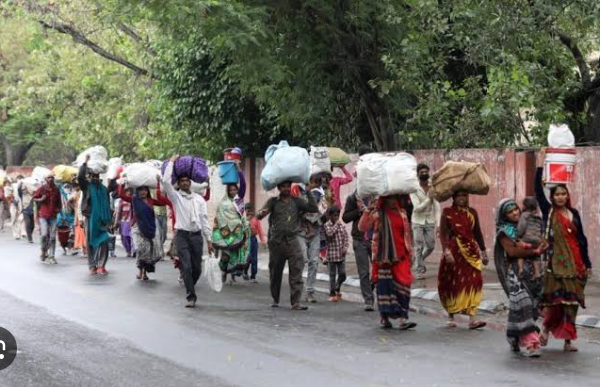
Empowering Communities: Rural Tourism’s Role in Economic and Social Growth
Embracing a Sustainable Future Through Rural Tourism
In the quiet corners of our rural landscape, a silent revolution is underway. Rural tourism, coupled with the principles of the sustainable development, is breathing new life into these communities. This blog post explains how rural tourism promotes sustainable practices, prevents migration, enhances well-being, and is supported by government policies. Join us on a journey from farm to tourist, discovering the transformative impact of tourism in rural areas.Rural Tourism, a most significant way to promote Circular Economy
The circular economy represents a significant shift from the traditional linear model of "take-make-dispose" towards a sustainable approach. This model emphasizes reducing waste, reusing materials, recycling resources and regenerating natural systems. In rural areas, the circular economy is particularly relevant, ensuring efficient use of resources and long-term environmental management. Via promoting rural tourism and its infra structure where natural resources are being used most optimally , growth in circular economy will certainly contribute a lot to ensure rural development as final objective.Rural Tourism as a Catalyst for the Economy
Rural tourism provides a unique opportunity to integrate sustainable development principles into daily life. Tourists are drawn to the authenticity and simplicity of rural areas, creating an ideal setting for sustainable tourism practices. Here's how rural tourism supports the circular economy:- Promoting Local Agriculture and Products Tourists enjoy farm-to-table experiences that directly support local farmers and artisans. By purchasing local produce, visitors contribute to the local economy and encourage sustainable farming practices.
- Sustainable Accommodations and Eco-Friendly Practices Eco-lodges and sustainable hotels minimize environmental impact while providing unique stays. These accommodations often use renewable energy, reduce waste, and promote water conservation, which aligns with circular economy principles.
- Community-Based Tourism and Cultural Preservation Tourists engage with local communities, learn about traditions and contribute to cultural preservation. This interaction helps maintain cultural heritage and promotes mutual respect and understanding.
Economic, Environmental, and Social Benefits of Rural Tourism
Rural tourism has numerous benefits, revitalizing local economies, enhancing environmental sustainability, and promoting social cohesion.- Job Creation and Local Entrepreneurship Tourism creates employment opportunities and boosts local entrepreneurship, providing a stable income to farmers, artisans and small businessmen. This economic boost helps reduce poverty and improve living standards.

- Boosting the Local Economy The increased tourist traffic boosts local businesses, thereby promoting economic growth. Tourists spend money on accommodation, food, souvenirs and activities, which keeps money circulating within the community.
- Reducing Waste and Promoting Recycling Eco-friendly tourism practices reduce waste and encourage recycling, which reduces the impact on the environment. This contributes to cleaner and more sustainable communities.
- Conservation of Natural Resources and Biodiversity Sustainable land use practices protect ecosystems and increase biodiversity. Rural tourism projects often involve conservation efforts that benefit local wildlife and plant species.
- Enhancing Community Engagement and Cultural Preservation Community-based tourism initiatives strengthen social bonds and preserve local heritage. By involving residents in tourism activities, these projects foster a sense of pride and ownership.
- Access to Healthcare and Education Increased income from tourism can improve access to healthcare and education, further enhancing well-being. Better financial resources enable families to provide better medical care and education opportunities for their children.
Reducing Migration through Rural Tourism
One of the most profound impacts of rural tourism is its ability to reduce migration. By providing local employment opportunities, rural tourism keeps residents in their communities, reducing the strain on urban areas.
- Local Employment Opportunities Rural tourism offers stable jobs, discouraging migration to cities. This stability helps maintain population levels in rural areas, preserving the social fabric.
- Successful Projects Reducing Migration Case studies from various regions highlight how eco-tourism initiatives have significantly lowered migration rates. These projects provide practical examples of how tourism can create sustainable livelihoods.
- Impact on Urban Areas Reduced migration alleviates the pressure on urban infrastructure, decreases unemployment, and mitigates poverty in cities. This balanced distribution of the population benefits both rural and urban areas.
Indian Government Policies Promoting Circular Economy and Rural Tourism
Government policies are crucial in driving efforts related to the economy development and the growth of rural tourism in India. Programs like the National Rural Employment Guarantee Act (NREGA), which creates jobs in rural regions, and the Swachh Bharat Mission, which strives to provide sustainable sanitation for everyone, allow communities to adopt sustainable behaviors and improve their level of living. On February 16, 2023, the Rural Tourism Village portal went live. Information on homestays and other rural tourism attractions in India can be found on the website. Some state governments, like the one in Uttar Pradesh, seek to invite applications to provide 20 percent subsidy to anyone who want to build set up for rural tourism.Challenges and Solutions
Integrating rural tourism with the economy development poses challenges, but innovative solutions can overcome these hurdles.- Common Challenges Limited resources, infrastructure problems and resistance to change are common barriers. Tackling these challenges requires a multidimensional approach and collaboration among stakeholders.
- Innovative Solutions Community-driven projects, public-private partnerships, and education campaigns can address these challenges. These solutions take advantage of local knowledge, external expertise and financial resources to create sustainable tourism models.
- Role of Collaboration Effective collaboration between stakeholders ensures that sustainable tourism practices are adopted and scaled up. Collaboration between governments, NGOs and local communities is essential for long-term success.
Conclusion: A Call to Action for Sustainable development through Rural Tourism
To sum up, rural tourism plays a significant role in promoting the economy development and bringing communities back to life. By adopting sustainable practices, rural communities inspire a worldwide movement towards responsible stewardship of our planet and ensure their own future. As we proceed along this route, let's recognize our accomplishments, draw lessons from our setbacks, and advocate for a time when sustainability and prosperity go hand in hand.One thought on “Empowering Communities: Rural Tourism’s Role in Economic and Social Growth”
Add a Comment Cancel reply
All Categories
- environment (6)
- Uncategorized (12)
Recent Posts
Urvian-K1 Comment
Best Online Jobs of 2024: A Beginner’s Guide
Urvian-K2 Comments
Top 7 Tried and Tested Hacks for Home Office Improvements
Urvian-K1 Comment
Top 10 Work From Home Business Ideas in 2024
Tags
2024 business trends
AI-driven SEO
AI and SEO
AI in digital marketing
authenticity in marketing
best home business ideas
Bhutan oxygen production
Bhutan sustainable development
brand engagement
BuildingMaintenance
Carbon sink Bhutan
cities with low pollution
content marketing
customer reviews
digital business ideas
digital marketing strategy
DrainageSystemMaintenance
Eastern Himalayas biodiversity
eco-friendly cities
Eco-tourism Bhutan
eliminate junk mail
entrepreneurship 2024
freelance jobs 2024
future of SEO
green cities
Growth in Economy
Innovative solutions
mailbox spam tips
Migration solution
mompreneur guide
on-page SEO
online careers 2024
RoofCollapsePrevention
Rural Tourism
SEO best practices
social proof
spam management for moms
stop mailbox spam
sustainable
sustainable development
top online jobs
UGC benefits
urban planning
user-generated content
work from home jobs
A HAVEN FOR BIG RISKS & BOLD IDEAS
URVI work is made possible through the support of a community of mentors, advisors, partners
7900900888
info@urvi.org.in




Thanks to the author for sharing rural tourism and its impact in simpler way